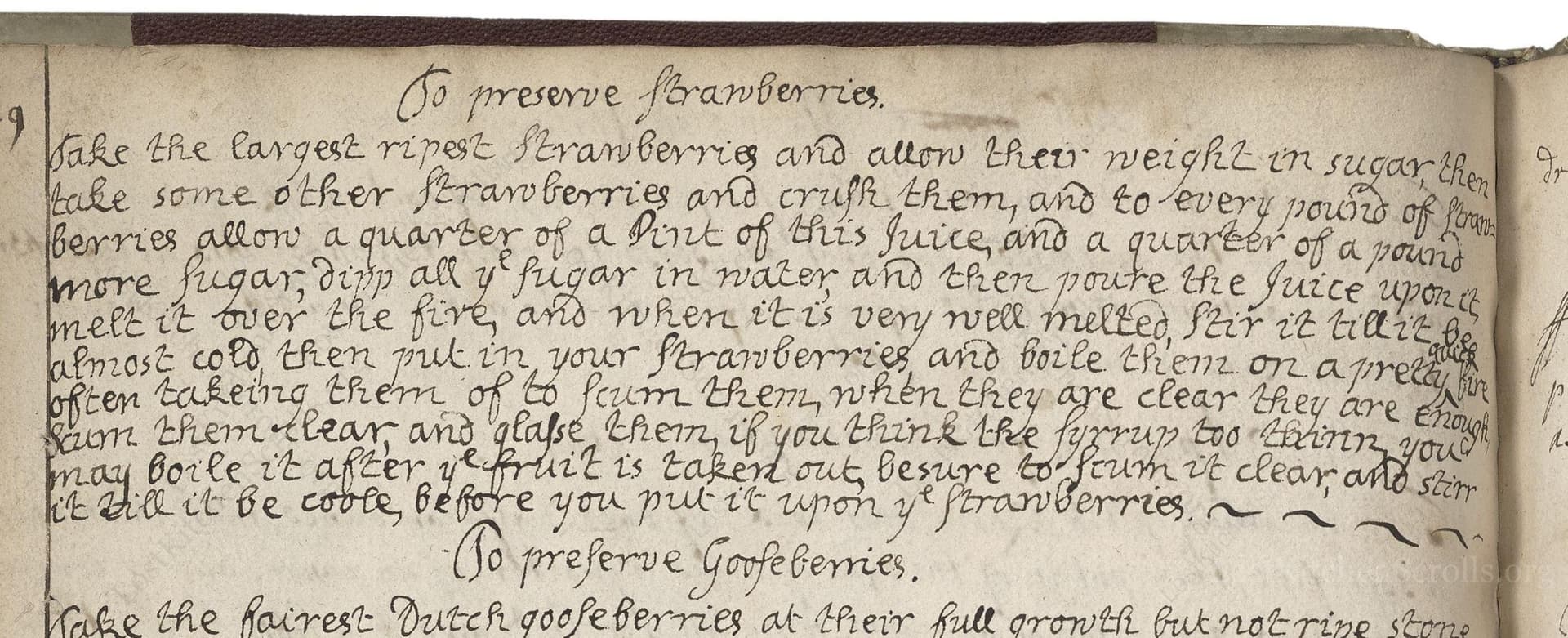To Preserve Strawberries
From the treasured pages of Receipt book
Unknown Author

To Preserve Strawberries
"take the largest ripest strawberries and allow their weight in sugar, then take some other strawberries and crush them, and to every pound of strawberries a pint of this juice, and a quarter of a pound of sugar; dipp all yr sugar in water, and then poure the juice upon it, melt it over the fire, and when it is very well melted stir it till it be almost cold, then put in your strawberries, and boile them on a pretty fire, often takeing them of to scum them, when they are clear they are enough, from them clear, and when the syrrup too thinn you may boile it after ye fruit is taken out, besure to scum it clear and stirr it till it be coole, before you put it upon yr strawberries."
Note on the Original Text
Seventeenth-century recipes like this are written as continuous instructions—almost stream-of-consciousness—and assume a high level of kitchen experience. Quantities are often defined by weight (sometimes by sense), and detailed timings are not given, under the assumption the cook will rely on visual cues like 'clear' syrup. Spelling is variable ('yr' for 'your', 'dipp' for 'dip', 'syrrup'), and punctuation is scarce. Directions are practical but open-ended, inviting improvisation. The recipe is less prescriptive than modern instructions, echoing the oral traditions and hands-on apprenticeship of early modern kitchens.

Title
Receipt book (1687)
You can also click the book image above to peruse the original tome
Writer
Unknown
Era
1687
Publisher
Unknown
Background
A charming culinary manuscript from the late 17th century, brimming with recipes that blend hearty tradition and a dash of Restoration-era flair. Perfect for those seeking a taste of historic feasts and flavorful ingenuity.
Kindly made available by
Folger Shakespeare Library
This recipe comes from a late 17th-century English manuscript, dating from roughly 1679 to 1694. During this period, fruit preservation was essential for enjoying seasonal produce year-round, and sugar was just starting to become more widely available, though still a prized and luxurious commodity. Recipes like this one straddle the line between medicine and cookery, as preserves were both a culinary delight and a way to store fruit through the winter. The technique here reflects elite household practices, where access to large amounts of sugar and fresh fruit indicated wealth and status.

The original cook would have used simple but sturdy kitchen wares: heavy copper or brass pans for boiling the syrup, wooden spoons for stirring, a sieve or muslin cloth for juicing the crushed strawberries, and earthenware or glass jars for storing the finished preserve. Cooking was done over a wood or charcoal fire, so careful attention was needed to maintain a 'pretty fire'—meaning a steady, moderate heat.
Prep Time
15 mins
Cook Time
45 mins
Servings
8
We've done our best to adapt this historical recipe for modern kitchens, but some details may still need refinement. We warmly welcome feedback from fellow cooks and culinary historians — your insights support the entire community!
Ingredients
- 1 pound 2 ounces large ripe strawberries (whole)
- 1 pound 2 ounces granulated sugar
- 1 pound 2 ounces additional strawberries (for juice)
- 2 cups fresh strawberry juice (from crushed strawberries)
- 4 1/2 ounces additional granulated sugar
- Water (about 3 tablespoons, or as needed to moisten sugar)
Instructions
- Begin with selecting the largest and ripest strawberries you can find—about 1 pound 2 ounces.
- Weigh out an equal amount (1 pound 2 ounces) of granulated sugar.
- Next, take another batch of strawberries (about 1 pound 2 ounces), crush them, and strain through a sieve to collect the juice.
- For every 1 pound 2 ounces of whole strawberries, use 2 cups of this fresh strawberry juice and add 4 1/2 ounces more sugar.
- Wet all the sugar with a little water to help it dissolve smoothly.
- Pour the strawberry juice over the sugar, heat gently, and stir until the sugar has melted completely.
- Let it cool slightly, then add the whole strawberries.
- Simmer the fruit and syrup over medium heat, skimming any foam that rises.
- When the strawberries and syrup look clear and glossy, remove the fruit from the syrup.
- If the syrup is too thin, keep simmering it until thickened, skimming as needed.
- Once it cools, pour it back over the strawberries.
- Let cool completely before storing.
Estimated Calories
180 per serving
Cooking Estimates
It takes about 15 minutes to prepare the strawberries and juice, and about 45 minutes to cook and simmer everything until the syrup thickens. This recipe makes 8 servings, with each serving having about 180 calories.
As noted above, we have made our best effort to translate and adapt this historical recipe for modern kitchens, taking into account ingredients nowadays, cooking techniques, measurements, and so on. However, historical recipes often contain assumptions that require interpretation.
We'd love for anyone to help improve these adaptations. Community contributions are highly welcome. If you have suggestions, corrections, or cooking tips based on your experience with this recipe, please share them below.
Join the Discussion
Rate This Recipe
Dietary Preference
Main Ingredients
Culinary Technique

Den Bockfisch In Einer Fleisch Suppen Zu Kochen
This recipe hails from a German manuscript cookbook compiled in 1696, a time whe...

Die Grieß Nudlen Zumachen
This recipe comes from a rather mysterious manuscript cookbook, penned anonymous...

Ein Boudain
This recipe comes from an anonymous German-language manuscript cookbook from 169...

Ein Gesaltzen Citroni
This recipe, dating from 1696, comes from an extensive anonymous German cookbook...
Browse our complete collection of time-honored recipes



